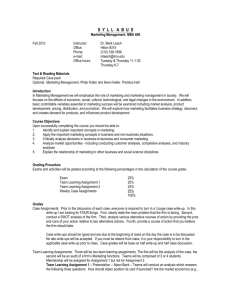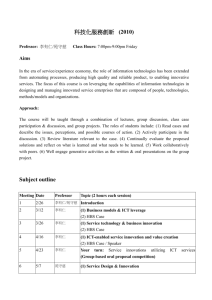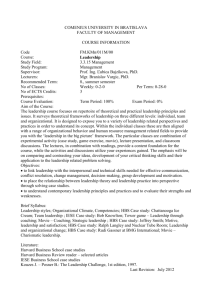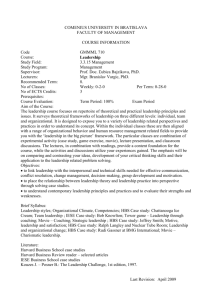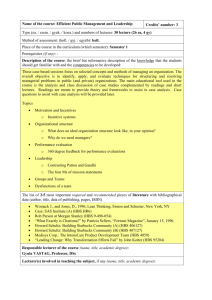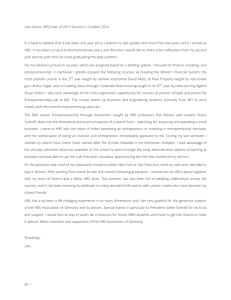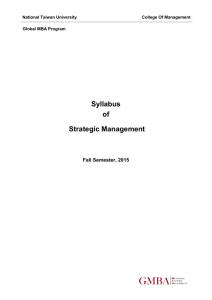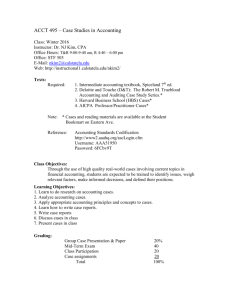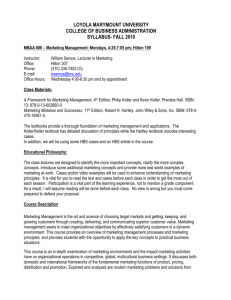Marketing Management
advertisement
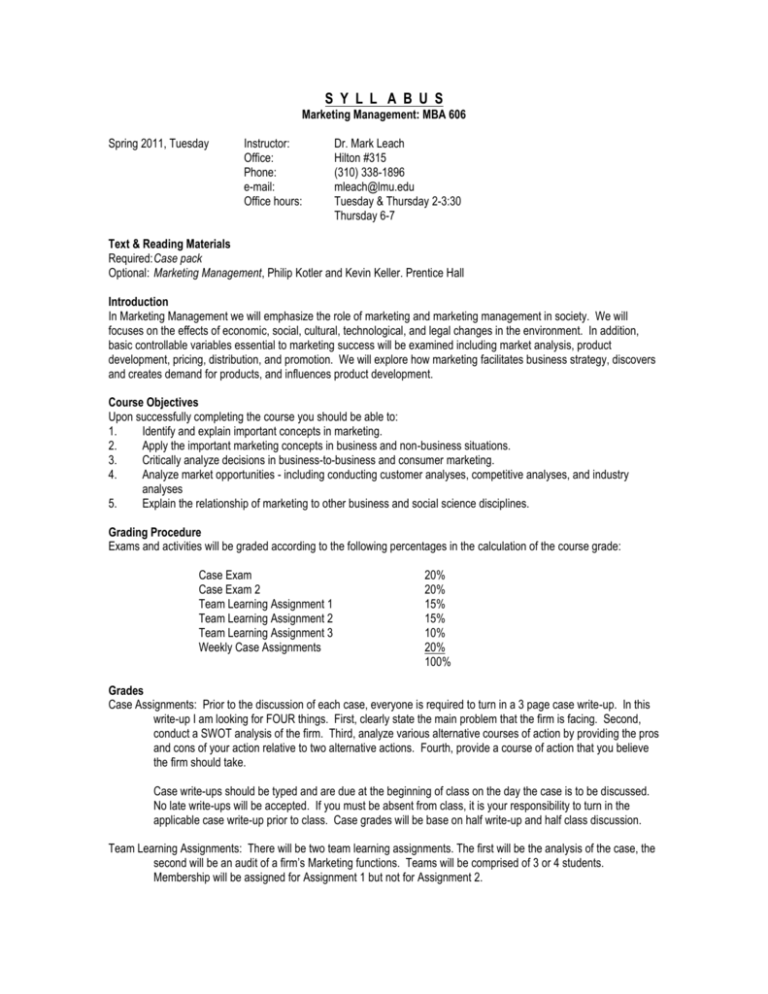
S Y L L A B U S Marketing Management: MBA 606 Spring 2011, Tuesday Instructor: Office: Phone: e-mail: Office hours: Dr. Mark Leach Hilton #315 (310) 338-1896 mleach@lmu.edu Tuesday & Thursday 2-3:30 Thursday 6-7 Text & Reading Materials Required: Case pack Optional: Marketing Management, Philip Kotler and Kevin Keller. Prentice Hall Introduction In Marketing Management we will emphasize the role of marketing and marketing management in society. We will focuses on the effects of economic, social, cultural, technological, and legal changes in the environment. In addition, basic controllable variables essential to marketing success will be examined including market analysis, product development, pricing, distribution, and promotion. We will explore how marketing facilitates business strategy, discovers and creates demand for products, and influences product development. Course Objectives Upon successfully completing the course you should be able to: 1. Identify and explain important concepts in marketing. 2. Apply the important marketing concepts in business and non-business situations. 3. Critically analyze decisions in business-to-business and consumer marketing. 4. Analyze market opportunities - including conducting customer analyses, competitive analyses, and industry analyses 5. Explain the relationship of marketing to other business and social science disciplines. Grading Procedure Exams and activities will be graded according to the following percentages in the calculation of the course grade: Case Exam Case Exam 2 Team Learning Assignment 1 Team Learning Assignment 2 Team Learning Assignment 3 Weekly Case Assignments 20% 20% 15% 15% 10% 20% 100% Grades Case Assignments: Prior to the discussion of each case, everyone is required to turn in a 3 page case write-up. In this write-up I am looking for FOUR things. First, clearly state the main problem that the firm is facing. Second, conduct a SWOT analysis of the firm. Third, analyze various alternative courses of action by providing the pros and cons of your action relative to two alternative actions. Fourth, provide a course of action that you believe the firm should take. Case write-ups should be typed and are due at the beginning of class on the day the case is to be discussed. No late write-ups will be accepted. If you must be absent from class, it is your responsibility to turn in the applicable case write-up prior to class. Case grades will be base on half write-up and half class discussion. Team Learning Assignments: There will be two team learning assignments. The first will be the analysis of the case, the second will be an audit of a firm’s Marketing functions. Teams will be comprised of 3 or 4 students. Membership will be assigned for Assignment 1 but not for Assignment 2. Team Learning Assignment 1 – Presentation – Alpen Bank – Teams will conduct an analysis which answers the following three questions: How should Alpen position its card if launched? Are the market economics (e.g., acquisition costs, break-even number of customers) achievable and expectable? Should Alpen Bank Launch a credit card? Why or why not? To answer these questions teams will need to assess potential revenues, fixed costs and variable costs. You will make a 12 minute presentation to the class which summarizes your findings, and you’ll have up to 10 PowerPoint slides to summarize your analysis. Team Learning Assignment 2 – Presentation – Metabical – Teams will conduct an analysis that answers the following questions: what is the best packaging solution for this drug? What is the best pricing strategy for this drug? The latter should be informed by an analysis of a demand forecast. Team Learning Assignment 3 – Paper and Presentation – Marketing Audit - Everyone, in a team of FOUR, is required to conduct a marketing audit of a company. This audit is described further on the last page of the syllabus. This project involves a paper and a presentation. A team project grade will be computed as the average of the grade on the paper and the presentation. Papers must be well organized using an interesting writing style that is grammatically correct. Expect a severe grade reduction for poor grammar. There are no excuses for late papers or being unprepared for presentations. Case Exams: The case exams will require the detailed analysis of a case. An exam case will be given at least one week prior to the exam date on the syllabus along with a set of case questions. Cases must be turned in by class time on the exam date stated in the syllabus. Exams should be typed and should not exceed 8 pages. NO LATE EXAMS WILL BE ACCEPTED! Attendance and Participation: Attendance and participation are required for success in this course. Everyone is expected to attend class regularly. Anyone who misses a class is responsible for what transpired that day. It is your responsibility to contact a classmate to determine what you missed. You are expected to do original work for all assignments. Students are responsible for their own conduct and all cases of dishonesty will be reported to the proper university officials. Please do not put yourself in an embarrassing or unfortunate situation. SPECIAL ACCOMMODATIONS: Students with special needs who need reasonable modifications, special assistance, or accommodations in this course should promptly direct their request to the Disability Support Services Office. Any student who currently has a documented disability (physical, learning, or psychological) needing academic accommodations should contact the Disability Services Office (Daum Hall # 224, x84535) as early in the semester as possible. All discussions will remain confidential. Please visit www.lmu.edu/dss <http://www.lmu.edu/dss> for additional information. Cases The cases that you will need to purchase for this class are listed below. They can be obtained from the Harvard Business School and the Ivey Business School. From Harvard Business School http://cb.hbsp.harvard.edu/cb/access/7912262 1) Saxonville Sausage Company 2) Aqualisa Quartz 3) Alpen Bank 4) Voss Artesian Water 5) Metabical 6) Tata Motors –The Tata Ace 7) Gino SA 8) Mountain Dew HBS 2085 HBS 9-502-030 HBS 4559 & 4556 HBS N2-509-040 HBS 4183 & 4186 HBS 9-108-011 HBS 902A13 HBS 9-504-040 Tentative Class Schedule Week Topic Reading Assignment January 11 Introduction to Marketing 1,2 January 18 Market Environment CASE: Delissa in Japan 3 January 25 Relationship Marketing and Customer Retention CASE: Dairyland Team Learning Assignment 3 - Group Membership - DUE 4,5 February 1 Consumer Behavior CASE: Saxonville Sausage Company 6,7 February 8 Organizational Buying Behavior CASE: Aqualisa Quartz Team Learning Assignment 3 - Company History – DUE 8,9 February 15 Targeting and Customer Acquisition CASE: Alpen Bank* – Team Learning Assignment 1 Presentation Prep 10,11,12 February 22 Team Learning Assignment 1 - Presentations March 1 SPRING BREAK – No Class March 8 Product Life Cycle & Product Development EXAM CASE 1 13 March 15 Branding Issues CASE: Voss Artesian Water from Norway 14 March 22 Pricing Issues CASE: Porsche 15 March 29 Issues in Channels of Distribution CASE: Gino SA 16,17 April 5 Promotion Issues CASE: Mountain Dew Team Learning Assignment 2 - Interview Dialogs – DUE 18,19,20 April 12 New Product Price and Demand forecasting Case: Metabical* - Team Learning Assignment 2 Presentation Prep April 19 Team Learning Assignment 2 - Presentations April 26 Team Learning Assignment 3 - Papers - DUE Team Learning Assignment 3 - Presentations May 3 EXAM CASE 2 - DUE Team Learning Assignment 3 - Marketing Audit The purpose of this project is to critically evaluate the marketing strategies of a specific company. You must learn all you can about the company and the industry through published sources and through conversations with knowledgeable persons. It is critical that you obtain cooperation from management within the company you are auditing in order to interview its managers, employees, and customers. You must keep a dialog record of all interviews (i.e., time, place, names or interviewers and interviewees, and the content of the interview). This record will be included as an Appendix to the final paper. You must submit the name of the company and a brief history by February 8th in class for approval. Late submission of the company history or changing companies on a later day will result in a lower grade. The completed paper should be turned in by class time, April 26th. Late projects will not be accepted. It is your responsibility to coordinate among your group members to complete your project by the due date. Keep a copy of your paper and presentation for your own record. Papers will not be returned. The complete paper should include 10 to 12 pages of content (double spaced, 11 or 12 pt. font). It should also include any relevant material in Appendices, and a complete reference list. The content of the paper could include these sub-titled sections: I. External and Internal Environment 1. Company history (up to 1 page) 2. Describe the markets, products & customers for this firm 3. Single out 2 trends in the environment that represent opportunities, and 2 trends that represent threats to this specific company. Under each opportunity, suggest a positive action. For each threat, suggest a defensive action. 4. Identify and compare the strengths and weaknesses of your company with its major competitor(s). II. Target Market and Channel Relations 1. Identify the target customers. Is there more than one type of target customer? What segmentation bases does the company use to identify its customers? 2. What is the form of the company’s channel relationships? Are there any e-commerce relationships? 3. What does the company do to build relations with their customers and their suppliers? 4. What are the company’s customer acquisition and retention strategies? III. Promotional Strategy 1. What is the company’s overall communication / promotion strategy? What medium does it use to advertise? How effective is advertising? 2. Does the company do trade shows? Evaluate their effectiveness? 3. Are personal selling and public relations important to this company? Describe and evaluate the appropriateness of personal selling and public relations. 4. Suggest any promotional strategies that may help your company. IV. Conclusions 1. What have you learned from this company? Overall, what is the performance level of this company? What are the important factors contributing to the success or failure of this specific company? 2. What would you do differently (if anything)? What would you suggest to your company for future action plans?
